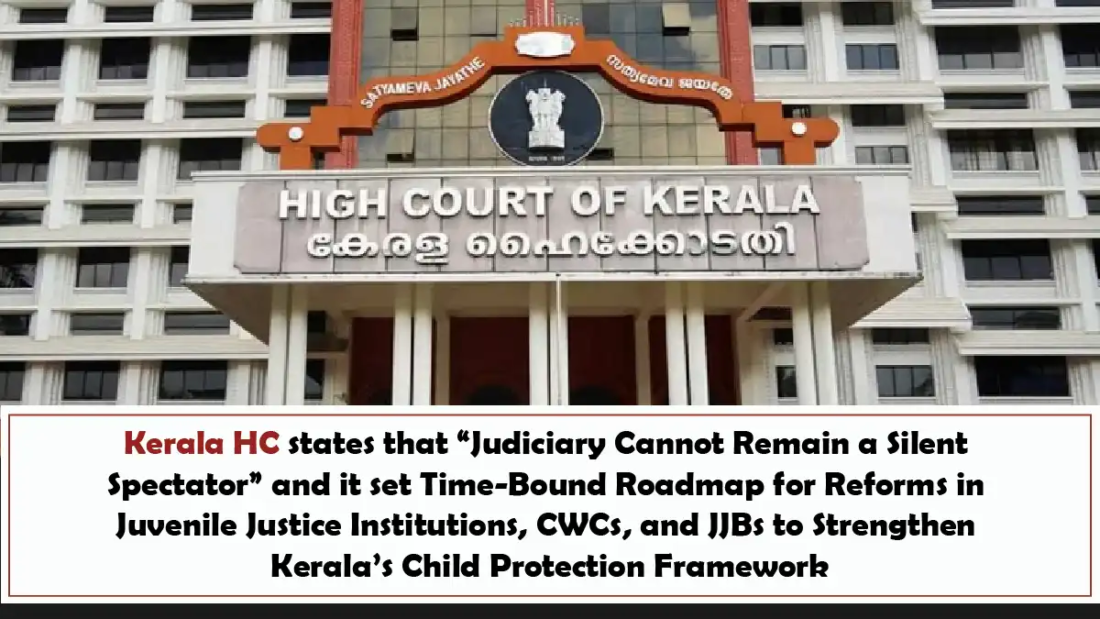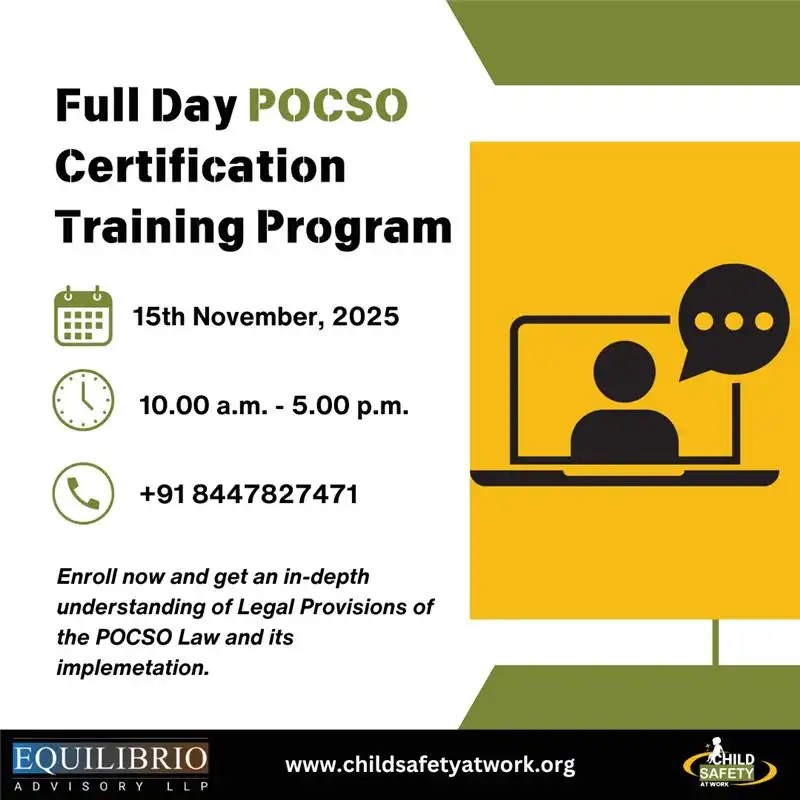Facts of the Case
The Kerala High Court delivered this significant judgment in two connected matters, a suo motu writ petition and a public interest litigation (PIL) filed by Bachpan Bachao Andolan, an NGO founded by Nobel Laureate Kailash Satyarthi, and its Programme Director, Sampurna Behura. Both petitions sought enforcement of the Supreme Court’s directions in Sampurna Behura v. Union of India [(2018) 4 SCC 433], which had mandated States and Union Territories to strengthen child protection mechanisms and ensure effective implementation of the Juvenile Justice (Care and Protection of Children) Act, 2015.
The Division Bench comprising Chief Justice Nitin Jamdar and Justice Basant Balaji heard the matters together. Justice Balaji authored the judgment, beginning with an evocative quote from Justice V.R. Krishna Iyer, observing that “the true measure of civilization lies in the fulfillment of our obligations to children.” The Court traced the evolution of juvenile justice in India, noting that while post-Independence reforms transformed the system from a punitive to a rehabilitative model, persistent challenges such as delayed trials, inadequate rehabilitation facilities, shortage of trained personnel, and limited awareness of juvenile rights continued to undermine the intent of the law.
Contentions of the Petitioner
The petitioners submitted that despite the Supreme Court’s 2018 judgment in Sampurna Behura, Kerala had failed to comply with several directives aimed at strengthening institutional child protection mechanisms. They argued that the State’s inaction resulted in systemic lapses, including unfilled vacancies in statutory bodies, poor monitoring of Child Care Institutions (CCIs), and non-functional Juvenile Justice Boards (JJBs) and Child Welfare Committees (CWCs).
They sought specific directions to the State to fill vacant posts in the Kerala State Commission for Protection of Child Rights (KeSCPCR), to reconstitute CWCs and JJBs, to establish effective monitoring and inspection mechanisms for CCIs, and to ensure implementation of welfare measures under the Juvenile Justice Act and Model Rules. The petitioners also emphasized the urgent need for accountability mechanisms such as social audits and data transparency through the National Mission Vatsalya Portal.
Contentions of the Respondent
The State of Kerala, represented through the Women and Child Development Department, submitted that various measures had already been initiated to strengthen the juvenile justice framework. The State contended that steps were underway to fill up vacancies, conduct inspections of CCIs, and ensure coordination between different stakeholders such as the KeSCPCR, State Child Protection Society (SCPS), and District Child Protection Units (DCPUs).
However, the State admitted to practical challenges, such as shortage of trained staff and delays in administrative procedures. It assured the Court of its commitment to comply with the statutory obligations under the Juvenile Justice Act, 2015, and the Supreme Court’s directives in Sampurna Behura.
Court’s Observations
The Court acknowledged the constitutional importance of the issue, stating that the judiciary bears a duty to ensure that children’s rights are not rendered “illusory by bureaucratic inertia.” Referring to Sampurna Behura, the Bench emphasized that “mere enactment of laws is not enough; their effective implementation is a mandatory obligation.”
The Court extensively examined the functioning of the Kerala State Commission for Protection of Child Rights (KeSCPCR) and found severe deficiencies in staffing and resource allocation. It observed: “The recurring delays in appointment in the Commission interrupt the continuity of its work. A shortage of supporting administrative and technical staff in units like the POCSO and Juvenile Justice Cells is also a persistent challenge, limiting the Commission’s ability to effectively handle the high volume of cases and conduct extensive monitoring across the State.”
The Court also scrutinized the functioning of the State Child Protection Society (SCPS) and District Child Protection Units (DCPUs), finding that inadequate human resources, weak inspection mechanisms, and financial constraints were impeding their performance. Similarly, vacancies among Probation Officers, JJB and CWC members were found to have hampered effective case management and rehabilitation.
Highlighting the transformative potential of technology, the Court urged the use of digital platforms for tracking, monitoring, and coordinating child protection activities under the Act. It underscored the pivotal role of Special Juvenile Police Units (SJPUs) and Child Welfare Police Officers (CWPOs), emphasizing that they must handle all matters concerning children “in a child-friendly and empathetic manner.”
The Bench also recognized the Kerala State Legal Services Authority (KeLSA) and District Legal Services Authorities (DLSAs) as crucial partners in ensuring access to justice for children. On social audits, the Court made a particularly notable observation:
“The audit goes beyond financial scrutiny to evaluate the quality of life in CCIs, checking for adherence to minimum standards of care, protection, rehabilitation, education, and social re-integration.”
In essence, the judgment reaffirmed that the State’s obligation toward children was not limited to administrative compliance but required proactive, time-bound, and measurable action to fulfill constitutional and statutory mandates.
Court’s Order
The Kerala High Court issued a comprehensive set of time-bound directions to ensure systemic reform and accountability under the Juvenile Justice Act, 2015. Key directions included:
- Filling Vacancies: All existing vacancies in the KeSCPCR to be filled within four weeks, and future vacancies to be initiated at least four months in advance to prevent disruption.
- Reports: The annual report for 2024–25 under the CPCR Act to be completed within eight weeks, with future reports to be published by June each year.
- Inspections: A multi-stakeholder SOP for annual inspections of all Child Care Institutions to be developed within three months.
- Reconstitution of Bodies: Reconstitution of CWCs and JJBs to be completed within eight weeks; both to meet statutory functioning requirements (CWCs must convene 21 days per month).
- Probation Officers: Anticipated vacancies in Probation Officers to be filled four months in advance.
- Data and Protocols: Preparation of a draft protocol for information and rehabilitation of children within three months and uploading data of missing and rescued children on the National Mission Vatsalya Portal.
- Police Units: Constitution of Special Juvenile Police Units (SJPUs) and designation of Child Welfare Officers in every police station within three to four months.
- Model Rules and Social Audits: Finalization of the Juvenile Justice Model Rules, 2016 within three months and conduct of annual social audits of every CCI, with reports due by June each year.
The Court directed that the Principal Secretary, Women and Child Development Department, Government of Kerala, would oversee and coordinate compliance, with all departments required to aid and assist.
Concluding the judgment, the Bench reiterated that children’s welfare was a constitutional imperative, remarking that the State’s commitment must translate into “action that safeguards, nurtures, and restores every child’s right to live with dignity and hope.”
Written by Adv. Deeksha Rai
 Cart is empty
Cart is empty 


